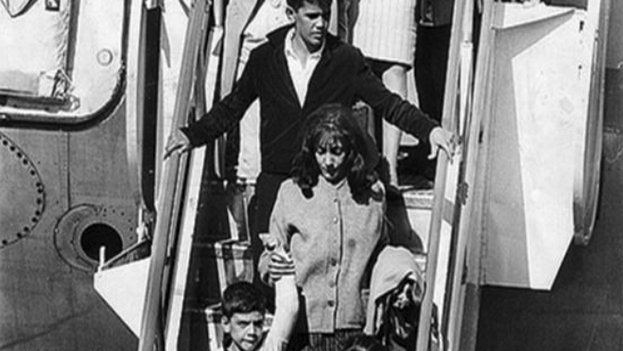
![]() 14ymedio, Emilo J. López, Miami, 25 February 2023 — The documentary El adiós de la esperanza [Journey to Hope], by Lieter Ledesma, a Cuban actor and presenter based in Miami, is a tribute to the more than 14,000 Cuban children who suffered the “uprooting of separation” when they were sent by their parents alone to the United States between 1960 and 1962, according to its director.
14ymedio, Emilo J. López, Miami, 25 February 2023 — The documentary El adiós de la esperanza [Journey to Hope], by Lieter Ledesma, a Cuban actor and presenter based in Miami, is a tribute to the more than 14,000 Cuban children who suffered the “uprooting of separation” when they were sent by their parents alone to the United States between 1960 and 1962, according to its director.
This debut film by Lesdema reveals those painful experiences through the testimony of five people who as children participated in Operation Pedro Pan (Peter Pan), a massive and heartbreaking exodus that was carried out clandestinely in the early years of the Castro dictatorship.
Ledesma says that many Cuban parents warned about the “radicalization of the revolutionary process” that involved “the closure of private schools, the prohibition of religious education and the stigmatization” of those who did not sympathize with the Revolution.
Many of those parents made the hard decision to put their children on flights to Miami to begin a new life in freedom.
The film, 52 minutes long, presents “intimate details” of the family separation caused by this exodus in the testimonies of Antonio Tony Argiz, today a successful businessman who founded and directed a firm with 800 employees in various parts of the United States, and of Eduardo Padrón, the Rector Emeritus of Miami Dade College.
“During the filming we met people who remember their childhood being shattered by the separation from home. Some can’t help but burst into tears with those memories,” says Iliana Lavastida, executive director of Diario Las Américas, the newspaper responsible for the production of the documentary, which is recorded in Spanish with English subtitles.
The memories, anecdotes and testimonies of these children of the Cuban exile, continues Lavastida, were marked by “traumas of experiences in orphanages or with unfamiliar families,” in addition to having to learn to communicate in an unknown language.
Those children, today adults, have a deep feeling of gratitude toward their parents, “whom they identify as the real heroes for having had the courage to give up watching them grow in order to ensure them a better future,” the producer emphasizes.
For Ledesma, Operation Pedro Pan was a “dramatic event that many families chose as a desperate solution. The Pedro Pan children, for the most part, grew up marked by the longing for a broken home and a land where they were born, which they mourn and feel is theirs.”
The operation, which began on December 26, 1960 and officially ended on October 23, 1962, with the suspension of all commercial flights between the United States and Cuba, took place shortly after the triumph of the Cuban Revolution.
The details of what to this day is considered the largest mass exodus of unaccompanied children on the American continent serve also to “demystify a certain narrative” that says Pedro Pan was an operation organized by the US State Department and the CIA to destabilize Cuban society in the 1960s.
“In the statements of the interviewees in the documentary, they make it clear that it wasn’t,” say Ledesma and Lavastida.
The architect of Operation Pedro Pan was Monsignor Bryan Walsh, who was in charge of receiving the minors, who were later transferred to camps, orphanages or adoptive families, initially until their parents managed to leave Cuba.
The other three testimonies in the documentary correspond to Miami businesswoman Aida Levitan, president of The Levitan Group; Enrique Ric Prado, who was director of Special Operations of the CIA Counterterrorism Center, and Eduardo Eddy Álvarez.
The five interviewed for the documentary are joined by the artists Willy Chirino and Lissette Álvarez, the Archbishop of Miami Thomas Wenski, the former mayor of Miami Tomás Regalado and the well-known Miami real estate developer Armando Codina, among some twenty testimonies.
The documentary directed by Ledesma will be shown on March 6 at the Miami Film Festival, organized by Miami Dade College.
This year’s programming includes more than 140 productions of various genres from 30 countries, including feature films, short films and documentaries, and more than a dozen world premieres, three in North America and seven in the United States.
Translated by Regina Anavy
____________
COLLABORATE WITH OUR WORK: The 14ymedio team is committed to practicing serious journalism that reflects Cuba’s reality in all its depth. Thank you for joining us on this long journey. We invite you to continue supporting us by becoming a member of 14ymedio now. Together we can continue transforming journalism in Cuba.
